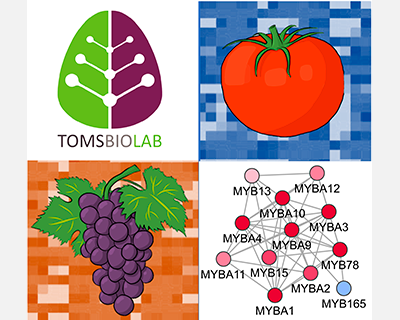Title: Systems biology approaches to understand the role of MYB transcription factors in the regulatory networks of secondary metabolism of fleshy fruits
Researh Group: Transcriptional Orchestration of Metabolism
Plants manufacture specialized metabolites that aid in the interaction and survival with their environment. These compounds, referred as secondary metabolites, influence quality traits in foods (such as color, flavor, texture and aroma), constitute a rich source of benefits towards human health and represent the building blocks for the development of novel pharmaceuticals. However, and despite their importance, they are limited in occurrence and restricted in a temporal and spatial manner. In particular, the processes controlling secondary metabolism in fleshy fruits are largely unknown and represent an enormous potential for the agro-industry sector. The project that we propose contributes in this knowledge by deciphering the gene regulatory networks of two very important secondary metabolic pathways: phenylpropanoids and isoprenoids. The core of this project is based in the use of multi-omics approaches and systems biology tools to determine how transcription factors (TFs) control each one of these pathways. As model systems we use tomato and grapevine, as i) they are two economically important fruit crops, ii) both constitute a good source of secondary metabolites and iii) an increasing amount of omics data are being continuously generated for these species. We propose that the regulatory processes that govern the accumulation of secondary metabolites can be straightforwardly studied by integrating genome-wide analyses that account for transcription factor genome occupancy, co-expression, transcriptome responses to TF activation or depletion and targeted quantification of metabolites. Transcription factors comprise a suitable case of study for addressing the behavior of modules in networks as they exhibit plethora of protein-protein and protein-DNA interactions, shaping complex regulatory processes. In this sense, the project has potential for identifying ways to improve nutritional contents in foods by identifying the regulators of such traits.
José Tomás Matus
- Manuel Rodríguez-Concepción (CRAG, CSIC-IRTA-UAB-UB)
- Carol Huang (Center for Genomics and Systems Biology, NYU)
- Dario Cantu (UC Davis)
Ministerio de Ciencia, Innovación y Universidades- Programa Estatal de Generación de Conocimiento, Proyectos de I+D de Generación de Conocimiento 2018
- CRAG, CSIC-IRTA-UAB-UB
- Center for Genomics and Systems Biology, NYU
- UC Davis
















